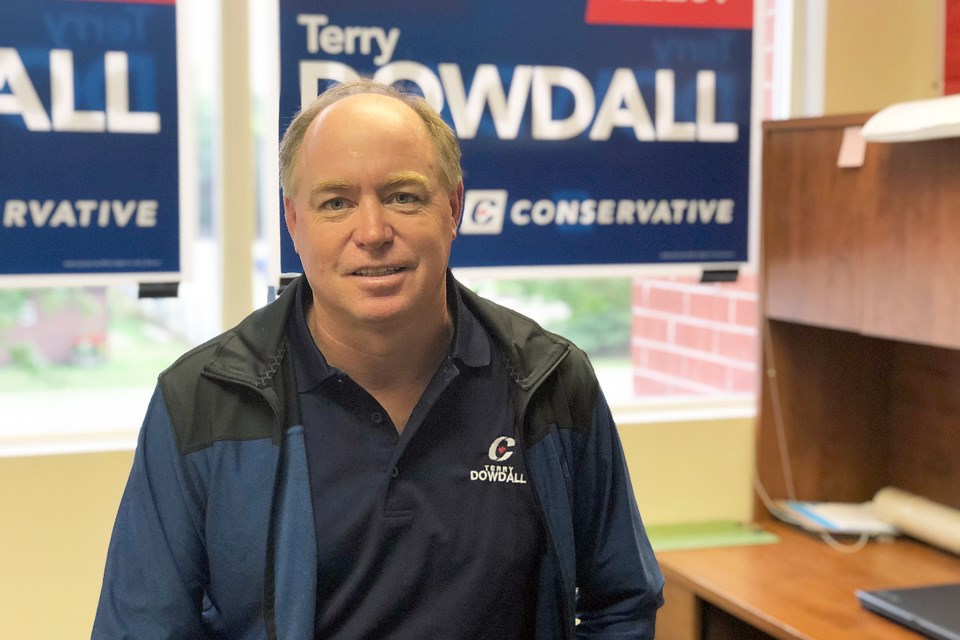CollingwoodToday has worked with a journalism student from Algonquin College to prepare a series of questions and answers with Simcoe-Grey candidates for your information. The topics discussed have a particular focus on the issues impacting youth and young adults in Canada, and in the Simcoe-Grey riding.
This series will include seven different articles with one question per article.
This Q and A has been edited down for length and clarity.
The following are each candidate's answers to the following question: Youth like all Ontarians care about the environment. In your community what do you intend to do to support your local ecosystem?
Terry Dowdall, Conservative: I will promote funding for grassroots and community groups that work to maintain a healthy environment.
There are super organizations in our area, such as the Blue Mountains Watershed Trust, that work on shoreline clean-ups, water protection and tree planting projects. I believe that we need to support efforts to protect and preserve our ecosystem, and aim to develop a policy to address a sustainable environment.
As well, we can reinforce protection against pests and invasive species, such as phragmites, that are threatening our ecosystem, we can support reinstating federal funding for wetlands, watersheds and fisheries conservation, and we can re-establish the Hunting and Angling Advisory Panel for constructive consultation so that those with the greatest interest in protecting species and habitats can share their expertise.
Last but not least, I would support education and providing resources that would empower community groups and young people to take action for a healthy environment.
Lorne Kenney, Liberal: As a Liberal Member of Parliament I would support necessary measures to reduce our over-dependence on fossil fuels and the transition to the green economy.
Locally, I have been involved with the Blue Mountain Watershed Trust, which focuses on striking the right balance between new development and preserving our marshes, wetlands, waterways and ecosystems. They have reinforced my long-held view that we need to proceed cautiously with development so that we leave our natural environment in good order for future generations.
Locally, much of the effort should focus on the transition away from internal combustion engines to more environmentally appropriate and friendly technologies.
I am very supportive of the effort to restore the Nottawasaga Lighthouse, which is part of both our marine heritage and an element of our social and environmental ecosystem.
In terms of the broader societal question, we know from both the BC experience and from the work of every reputable economist who has studied the matter that putting a price on pollution is the most effective way to lead the transition to a green economy.
Richard Sommer, PPC: The PPC party is very strong on supporting initiatives to promote clean air, water and land.
We know that there's such a thing as ‘climate change.’ But, we don't accept the premise that it’s caused by human beings.
We don't believe that there is a crisis per se. But having said that, we believe that our resources, our land, and the things I mentioned, they should be well cared for. And so we are by no means, well let me say it positively, we feel very strongly that these things should be protected. We also believe that we should encourage innovation that would increase green energy, and more efficient vehicles, and less pollution and so on. We’re all for that.
We believe very strongly that if the free market is allowed to operate by lower taxes and so on, then consumers will drive innovations like that.
Sherri Jackson, Green: We have a plan overall to improve the protection of our natural resources and our wetlands as well as our parklands by an increase of 30 per cent. The Environmental Protection Act was pretty seriously hurt in the last few governments and so we plan to re-implement all of the protections for the Environmental Protection Act. We also plan to work very closely with our Indigenous communities and building ecological wisdom so that we can learn how to work sustainably within our environment, and make sure that we are protecting our natural resources so that corporations don't have access to our natural resources and our water before our citizens do.
Ilona Matthews, NDP: Everyone should be reducing their carbon footprint, doing everything they possibly can.
I actually joined an organization [Climate Action Team] that is going to be quite militant about climate change and the environment. We're going to help deal with these things, whether it's individuals going to the government, whether it's protesting, whether it's looking at making the government regulate some of these things that corporations are doing as far as dumping in the river in the lake, and manufacturing and non-biodegradable products.
Tony D’Angelo, Veteran’s Coalition Party: Here in Alliston where I live, we have industry and industry is starting to work.
I find like with our party’s platforms, it's the carbon tax that has been implemented by the Trudeau government. To me, it's almost like a free pass, you buy carbon credits, but it's not going to change what you're doing in terms of cleaning your act up.
We need to get more involved in cleaning up the act of the polluters and get everyone on board with taking care of everything environmentally wise.
Everyone is aware of what the situation is. But we need to improve the way we do things. Unfortunately, oil as much as people want to say we need to get off oil.
Oil is going to be around for a long time, because our economy is based on oil. So we need to improve all of the emissions that we are creating, that are bringing down effects to the environment.

.jpg;w=120;h=80;mode=crop)



